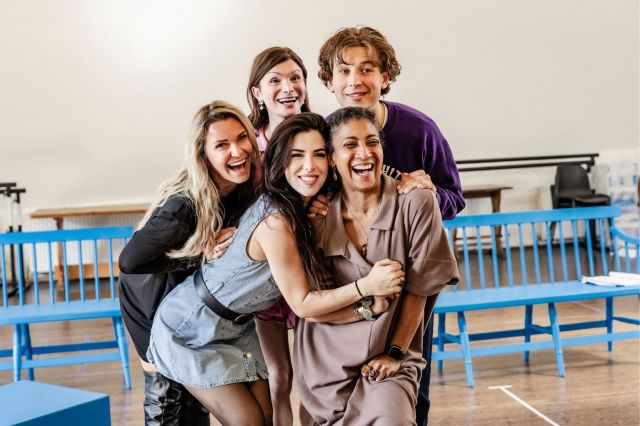Dr Strangelove West End review – Steve Coogan delighting in the war room
The classic film is the starting point for this new stage production

A black comedy about the end of the world feels an appropriate entertainment for our frightened and frightening times. And there’s no doubting the heartfelt admiration of Stanley Kubrick’s classic 1964 film contained in this faithful stage adaption by Sean Foley and Armando Iannucci.
It’s hard to fault either the comic virtuosity of Steve Coogan who goes one better than the late, great Peter Sellers in the movie, and plays four characters including the frantic scientific genius Dr Strangelove.
Yet for all the good will and the many laughs, there’s something strangely effortful about this adaptation. There’s a sense that it’s been created because it can be done, rather than bringing any particularly new satirical insight to the story.
So it is that the tale begins in Cold War territory when General Ripper, the US commander of Burpelson Air Force (played with rapidly escalating, wide-eyed madness by John Hopkins) becomes convinced that the “sneaky” Russians have launched an attack, despite all evidence to the contrary. “The nature of a sneak attack is that it is sneaky,” he argues, with absurd logic, as he authorises an unstoppable nuclear retaliation.

His second in command, a wimpy RAF officer called Captain Mandrake, who tries with increasing desperation to talk him out of it, gives Coogan his first role, all beetling brows and old fashioned gosh-by-golly language. Then, as the action switches to the War Room in the President’s nuclear bunker, he becomes in turn hapless President Muffley (the clues are always in the weakly punning names) who is on the phone to his Russian opposite number in an attempt to diffuse the crisis. Until he discovers that the Soviets have invented a machine that is going to destroy the planet and all its inhabitants.
Coogan has most fun as the two other characters in play: as the wheelchair-confined Strangelove in a wild, white wig, he makes the most of the character’s tendency to praise the Nazis while his arm inadvertently jerks upwards. Where Sellers made the salute the joke, Coogan dwells in the small silence afterwards, where he recants his previously stated opinion.
Then finally he is Major TJ Kong, the gung-ho commander of the B52 bomber on its way to its target, refusing to countenance any possibility of recall, ranting about the Russian air smelling of “fear and potatoes”, while the US atmosphere is one of freedom, and riding the bomb to its destination with unhinged glee.
All of this is skilfully realised on Hildegard Bechtler’s monochrome set, which mixes traditional structures of desks and airplane cockpits with Jessica Hung Han Yun’s lighting and Akhila Krishnan’s cleverly realistic projections to create an impressive range of settings. Ben and Max Ringham provide an atmospheric soundscape while Foley’s own direction keeps up the hysterical pace, although the second act is notably more gripping than the first, perhaps because doomsday is rapidly approaching.
There are enthusiastic and sharp performances too from Giles Terera as General Turgidson, a man barely in control who can never attempt to calm a situation without inflaming it, and Tony Jayawardena as the Russian ambassador Bakov, whose world-weary realism contrasts with the increasing panic.
The extreme masculinity of the piece is leavened both by a few jokes at exactly that, and a couple of funny but oddly out of place musical routines. The script is as pointed as you might expect from Iannucci, but on the whole he has resisted the attempt to update the action, apart from one gag where President Huffley moans that he wishes the other guy had won. “He still thinks he did,” comes the retort.
It’s a pointed moment in a play that feels short of them. It’s entertaining but never quite as savage as you expect.



















